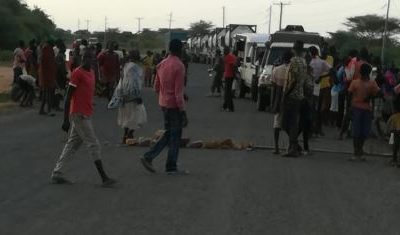Is it time that flies so fast or is it individuals that change their minds so easily? It is barely three months since President Uhuru announced the oil sharing agreement, which was rejected by the Turkana community as they opted for 10% rather than the given 5% citing lack of involvement. Well, the music is now different.
Turkana residents have now agreed to receiving the uncapped 5%, but with a demand. They want the revenue from the 5% to be given as direct cash transfers. This cash transfer is what they call lopetun. In this system, money will go directly into people’s accounts or smart cards, similar to that of retiree’s benefits’ plan. By this they get to decide how, where and when to spend the money without any trust or committee watching on how it is spent. Remember this is to go on throughout the oil extraction process, say the next 23 to 25 years.
They have lobbied for lopetun and managed support from some of their leaders like Turkana South MP Hon. James Lomenen. In an interview by Maata FM, Lomenen said he would fully represent his people’s thoughts, if they want lopetun, then he will give his full support. In their defense, Lomenen together with other MCAs backing this system, say that since locals have been struggling with basic needs, this was the right way to alleviate poverty. Another view was that with this money (lopetun), residents can buy food or start up their own small business where they’d generate income for themselves, rather than waiting on relief food as they have in the past.
Other residents also argue that all funds like the county government allocation, equalization fund, donor and well-wishers fund, oil revenue on national and county share among others have all been going to development, and this would be the only one going directly to the people.
As valid as these points of view may be, how sustainable is this system? The living will enjoy this money to the last drop, how about the coming generation? Since oil is a natural resource, it is our children and their children’s children right to benefit. Will they start their hustles from scratch because their fathers were not visionary enough? For by that time oil would be obsolete. The method is more short term than sustainable.
How safe is this system? If initially wars and conflicts had existed between the Turkana and the neighboring Pokot, what makes one think that sharing money may not brew issues of clash? If they have not been peaceful around the same borders, do you think they would share clean cash from the oil revenue? That aside, with money in a man’s hand, the number of wives if not girlfriends would definitely increase? With increase in social relations comes the idea of HIV/AIDs, unwanted pregnancies, cirrhosis because drinking would also be on the rise and so on.
This system will promote a consumer economy rather than a productive one. For example, let’s assume an affected resident will be earning a hundred thousand monthly from the 5%, do you think they’d be motivated to wake up early every day to go to work? I don’t think so. They’d be a bit lazy knowing a ‘salary’ would be on their door come the end month, and still look forward to the next pay day once the 100k is used up.
There are better ways the 5% could still be spent by the local community directly. They could invest the cash and reap good profits from it. This way, they may even seize to look upon the revenues from the 5% as they would by then be dependent and self-reliant. Another way to spend this money is by channeling part of it to sponsor the education of their children, from kindergarten way up to Universities. At least a new generation would have benefited from the oil, resulting in a drop in the illiteracy number thus raising citizens that can secure business or employment without much hustle.
Part of it could also be spent on peace campaigns. As much as the oil would bring development to the people, development cannot thrive minus peace, as peace is the foundation of development. There are so many ways to look at it, Turkana locals should be educated more on this issue, so they will not look back and regret their decisions.

